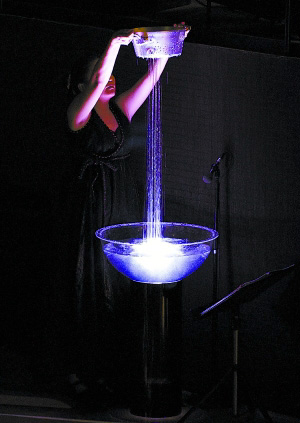A memorable and challenging modern Chinese Opera....
|

|
|
Tea – A Mirror of Soul
Composer: Tan Dun
July 31, 2008
The National Center for Performing Arts |
Reviewed by David Ferguson
Tea – A Mirror of Soul is an opera by the world-famous Chinese composer Tan Dun. Using Tea as an allegory of life, love and death, the opera tells of a tragic love triangle between Lan, a Princess of the Tang Dynasty, her brother the Crown Prince (whose name, oddly, we are never told), and Lan's suitor Seikyo, a Japanese nobleman who recounts the tragedy in retrospect to his fellow monks in the monastery to which he has retreated.
As a contemporary work the opera lacks the stirring songs and rousing choruses of classical Western opera, but the music and the lyrics are always challenging and original, and never descend into anything approaching self-indulgence. Unusually, the opera was written and is generally performed in English – the National Center for the Performing Arts (NCPA) auditorium has an LCD screen high above the stage which provides simultaneous subtitles in both English and Chinese.
One of the highlights is a spectacular range of original instruments, presented by a team of six graceful and talented female musicians on the stage itself. These accompany the whole of the story, and include a bowed instrument like the spokes of a copper birdcage, glass basins of water that are alternately played with the hands, with upturned glasses, and on one occasion with a colander, rice paper that is crushed, torn, or blown up as a bag, and stiff paper hangings suspended from the roof of the stage that are shaken and drummed.
While fascinating, these offerings compliment rather than distracting from the singing, and they combine with the western and eastern instruments in the orchestra pit to produce an ensemble that maintains the interest of the audience throughout.
The outstanding feature of the opera is the Second Act, when Lan and Seikyo are on their way into the mountains in search of Lu Yu, possessor of the mysterious Book of Tea. In a spectacularly erotic passage, Lan bewitches and seduces Seikyo with a Song of Tea which is an allegory for love and sex. The accompanying backdrop of stylized animations of copulating animals is both intriguing and unsettling.
I thoroughly enjoyed this evening, and I look forward to many more at the NCPA.
The National Center for the Performing Arts was first conceived by Mao in 1958, but the project to create it did not get under way until 1998, and it was finally completed in 2007.
The Center is located to the south-west of Tian'anmen Square, only a few paces from the Tian'anmen West Underground station on Metro Line 1. Its dramatic form, in the shape of an elliptical hemisphere, dominates the western entrance to the square.
|

|
|
A scene from Tan Dun's opera "Tea: a Mirror of Soul" which was staged at the National Center for the Performing Arts in Beijing on July 30, 2008. [cnsphoto] |
Comprising a central Opera House with a Concert Hall and a Theater on the wings, the Center provides seating for audiences of almost 5,500 people, and presents a vast range of traditional and contemporary works. The entrance stair leads into a long underground passage full of interesting and original features – one being a ceiling of water and glass formed by the base of the three-hectare lake that surrounds the site – that leads into the Center itself.
The wide, bright passage, lined with heavy contemporary steel sculptures, is itself the site of exhibitions and presentations. Currently, there is a photographic exhibition of many of the world's great performance venues on the right, featuring such as the Royal Albert Hall in London, the Kennedy Center in New York , and of course, the Opera House on Sydney Harbor. On the left is a montage of information on the lives of some of history's best-known composers, artists and writers, which as a result of an alphabetical coincidence provides an interesting juxtaposition of Mozart, one of the West's great composers, with Li Bai, one of China's finest poets.
The Center itself offers a number of dramatic vistas and backdrops from a maze of stairs and escalators. The ceiling is a spectacular mosaic of criss-crossed hardwood, while the flooring is a patchwork of polished stone from the various regions of China.
(China.org.cn August 1, 2008)